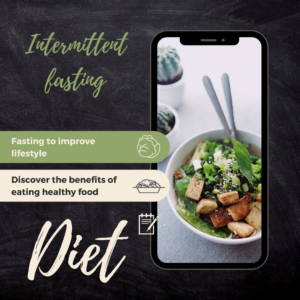
So, you’re thinking about trying intermittent fasting (IF) because, well, your favourite Instagram influencer swears by it? How about pausing for a moment? Before jumping on the latest and trading diet plan, have you ever wondered if intermittent fasting is even for you? Raise your eyebrows as far as you want. But the truth won’t change. And the truth is, it or not, many scientific studies suggest that a simple calorie-restricted diet can have similar benefits to IF. Yet here we are, endlessly debating what the best approach is for a “healthy diet.”
Now, let’s clarify one thing: intermittent fasting didn’t magically appear out of thin air. It’s been around for a while, popularised by Dr Michael Mosley’s 2012 BBC documentary Eat Fast, Live Longer, and then further by Kate Harrison’s book The Fast Diet. While a substantial portion of the scientific community believes in its potential benefits, IF can be fatal for some people. Shocking, right? So, let’s plunge into what intermittent fasting is all about—its benefits, downsides, and whether it’s really worth all the hype.

5 Amazing Benefits of Intermittent Fasting
1. Weight Loss
Let’s face it, most of us consider intermittent fasting to lose those extra pounds. And hey, it has its moments. Different studies show different results. Let’s do a quick analysis of the past findings of these studies. Shall we?
But let’s take an oath of not getting too carried away. A 2022 study shows that to follow intermittent fasting, individuals followed a 5:2 intermittent diet plan. This 5:2 intermittent diet Plan helped participants lose 9.0 ± 5.3% of their baseline body weight. Yes, that’s quite a range!
Here’s a quick breakdown of the Different Scientific findings of people who choose IF:
2022 :
131 individuals with obesity 9% weight loss over 12 weeks using the 5:2 method
2020:
27 studies showed weight loss ranging from 0.8%–13% of baseline body weight following intermittent fasting
2020:
16:8 Method Diet Plan followers felt Significant weight loss when eating was restricted to an 8-hour window
Sure, these results seem promising. But let’s be clear, most studies also point out that regular calorie-restricted diets show similar results. So, there you go—weight loss? Yes, but no magic bullet here.
2. Lower Risk of Type-2 Diabetes
Some say intermittent fasting could reduce insulin resistance, potentially lowering the risk of type 2 diabetes. A 2022 Review concluded that IF might indeed lower insulin production due to reduced calorie intake. However, this same review also noted the lack of solid evidence that intermittent fasting is any more effective than traditional caloric restriction. More research is obviously needed.
Just to add some spice to this debate, a 2018 rat study suggested that intermittent fasting could increase the risk of diabetes. Surprising, isn’t it? The study tracked intermittent fasting in rats over three months. Of course, more research is needed to see if these findings apply to humans. Then, a 2015 Study noted that intermittent fasting could regulate blood sugar better in males than in females. It heightens blood sugar levels in women only after three weeks of fasting.
So, IF might not be the holy grail for Type-2 diabetes prevention, especially for everyone.
3. Improved Heart Health
IF has been linked to better heart health. A 2016 Review suggested that intermittent fasting could lower blood pressure, heart rate, cholesterol, and triglycerides in humans and animals. Now, don’t get too excited; triglycerides are fats linked to heart disease. Lowering them is definitely beneficial, but how much of it can be solely attributed to intermittent fasting is still up for debate.
4. Changes in the Function of Hormones
Intermittent fasting can trigger some pretty interesting changes in your body. Let’s look below at how.
- Insulin promotes fat storage. It lowers insulin levels, promoting fat burning.
- Human Growth Hormone (HGH) supports muscle growth and fat burning. IF increases HGH levels significantly.
Also, gene expression can lead to diseases. This diet plan changes gene expression for longevity and disease prevention |
Yes, it sounds pretty scientific and all. But do these changes make you feel like a superhero? Not quite. Remember, while some hormonal changes can be beneficial, they’re not exclusive to IF.
5. Better Brain Health
There’s some buzz around intermittent fasting improving brain health. Animal studies from 2018 and 2021 suggest fasting could protect brain health and enhance cognitive function. The keyword here? Animal studies. Some research indicates it might aid in preventing neurodegenerative disorders like Alzheimer’s and Parkinson’s. But we still need more human studies to say this confidently.
So, we are pretty sure that you are convinced that it can’t only have benefits. As it has major downsides. But do you know lots of myths are roaming over the internet about this IF? Let’s quickly debunk them one by one.

Also Read: Probiotics vs Prebiotics Benefits: Know the Difference Before It’s Too Late!
Myths of Intermittent Fasting
So, squash some myths because why not?
Myth 1: Intermittent fasting is the Ultimate Weight Loss Solution
Well, we hate to break it to you. This is not reality. Sure, time-restricted eating plans can produce weight loss, but so does any diet that reduces calorie intake! Plus, studies suggest that a one-year period isn’t enough to conclude long-term weight loss via IF. So, if you think skipping breakfast will magically make you look like a ramp model, think again.
Myth 2: Anyone Can Do IF
Nope! IF is not for everyone. Those at risk include:
- Pregnant or lactating women
- Anyone under 18
- Individuals on medications that require regular meals
- People who have eating disorders
Consequently, assess whether IF is right for YOU before jumping on the craze.
Myth 3: Intermittent Fasting Lowers Diet Quality
Hold on! We are pretty sure that Dr. Michael Mosley would be devastated by seeing this claim. Because IF doesn’t tell you to avoid fruits, veggies, or carbs. Not what you eat matters, but when you eat it. It doesn’t mean gobbling extra-cheese nachos at 2 a.m. while binge-watching GOT. It’s more about setting an eating window, say, between 12 p.m. and 8 p.m.
Read Also: Eli Lilly Weight Loss Drug in India: Relief to Stubborn Obesity
Do You Need to Do Intermittent Fasting?
Now you have come to a crucial part of our discussion. There is some good evidence suggesting that an 8-hour sleep followed by a healthy diet and lifestyle is enough. Sufficient and efficient for reducing weight, particularly for individuals at risk of diabetes. Most importantly, if you have Type 1 diabetes, an eating disorder, or are expecting a child then intermittent fasting might not be the ideal option. Why not first get advice from a medical professional?
Watch this video from Dr. Pal to get started on intermittent fasting:
So, What’s a More Balanced Approach?
How about trying a more holistic way to wellness instead of an extreme IF plan?
- Avoid sugars and refined grains: Instead, include whole fruits, vegetables, beans, lentils, whole grains, lean proteins, and healthy fats in your diet. You already know the basics.
- Limit your eating window: No, don’t starve to death; simply avoid snacking all day.
- Use HealthifyMe: HealthifyMe is an app that helps you manage your diet, weight, and fitness goals. Personalised meal plans make the whole process so much easier!
- Consult with a nutritionist: Rather than following one-size-fits-all diet plans, seek expert advice for a diet suited to your lifestyle.
Why don’t you get started with HealthifyMe and Kapiva?
Still not sure if Intermittent fasting is right for you? Why not get personalised advice with the HealthifyMe app? It offers nutrition plans and lifestyle guidance, focusing on what really works for you.
And while you’re at it, check out Kapiva for holistic health products. Their herbal supplements and teas can fit seamlessly into any diet plan you choose.
Also Read: Explore Stress and Gut Health Connection: How Stress Affects Gut Health and Digestion
Conclusion
In brief, we can say intermittent fasting definitely has some health benefits, but it’s not a magic pill. So, yes to answer your question, it is scientifically approved. Scientific evidence supports its advantages in weight loss, heart health, and blood sugar regulation. But is it for everyone? No, absolutely not. Just like other things, there is no jack of all diets” exist. It is not universally effective or suitable for everyone. Consider this diet plan if you’re in generally good health. But don’t you neglect the basics? That is well, sleep well, and listen to your body.
Ready to explore healthier lifestyle options? Mail to HealthyMe today for personalised nutrition and wellness plans. And, of course, Try Kapiva’s Doctor’s Free Consultation to avail natural health products to keep your diet balanced.
After all, it’s not about looking like a 24-year-old London ramp model; it’s about focusing on your health and what works best for you.
FAQs
1. How do you pronounce “Intermittent Fasting”?
Answer: “Intermittent fasting” is pronounced as /ˌɪn.t̬ɚˈmɪt.ənt ˈfæstɪŋ/. It sounds like “in-ter-MIT-ent FAS-ting.”
2. What are the best books on intermittent fasting?
Answer: Some popular books on intermittent fasting include:
- The Complete Guide to Fasting by Dr Jason Fung
- Fast. Feast. Repeat. by Gin Stephens
- Delay, Don’t Deny by Gin Stephens
- The Obesity Code by Dr Jason Fung
- Life in the Fasting Lane by Dr Jason Fung, Eve Mayer, and Megan Ramos
3. What is the 16/8 intermittent fasting method?
Answer: The 16/8 intermittent fasting method involves fasting for 16 hours and eating within an 8-hour window. For example, if you eat between 12 PM and 8 PM, you would fast from 8 PM to 12 PM the next day. This method helps with weight loss, insulin sensitivity, and metabolic regulation.
4. What is the best intermittent fasting schedule?
Answer: The best intermittent fasting schedule depends on individual goals and lifestyle. Common schedules include:
- 16/8 method – 16 hours of fasting, 8-hour eating window
- 14/10 method – 14 hours of fasting, 10 hours of eating window
- 5:2 method – Eating normally for 5 days, consuming only 500–600 calories for 2 days
- OMAD (One Meal a Day) – Eating only one meal within a 1-hour window
- Alternate-Day Fasting – Fasting every other day
5. What is the best intermittent fasting method for weight loss?
Answer: The 16/8 method is the most popular and effective for weight loss, as it is sustainable and easy to follow. However, other effective fasting methods for weight loss include:
- OMAD (One Meal a Day) for rapid fat loss
- Alternate-day fasting for those comfortable with longer fasts
- 5:2 Diet for moderate calorie restriction
6. What is a good intermittent fasting diet plan?
Answer: A healthy intermittent fasting diet should include:
- Protein: Eggs, chicken, fish, tofu
- Healthy Fats: Avocados, nuts, olive oil
- Fibre: Vegetables, whole grains, legumes
- Hydration: Plenty of water, herbal teas, black coffee
Sample 16/8 Diet Plan:
- 12 PM (Lunch): Grilled chicken, quinoa, and salad
- 3 PM (Snack): Greek yoghurt with nuts
- 7 PM (Dinner): Salmon with steamed veggies and brown rice







Thank you for sharing excellent informations. Your site is so cool. I am impressed by the details that you’ve on this website. It reveals how nicely you perceive this subject. Bookmarked this website page, will come back for more articles. You, my pal, ROCK! I found just the info I already searched all over the place and just could not come across. What an ideal site.
психолог калуга отзывы